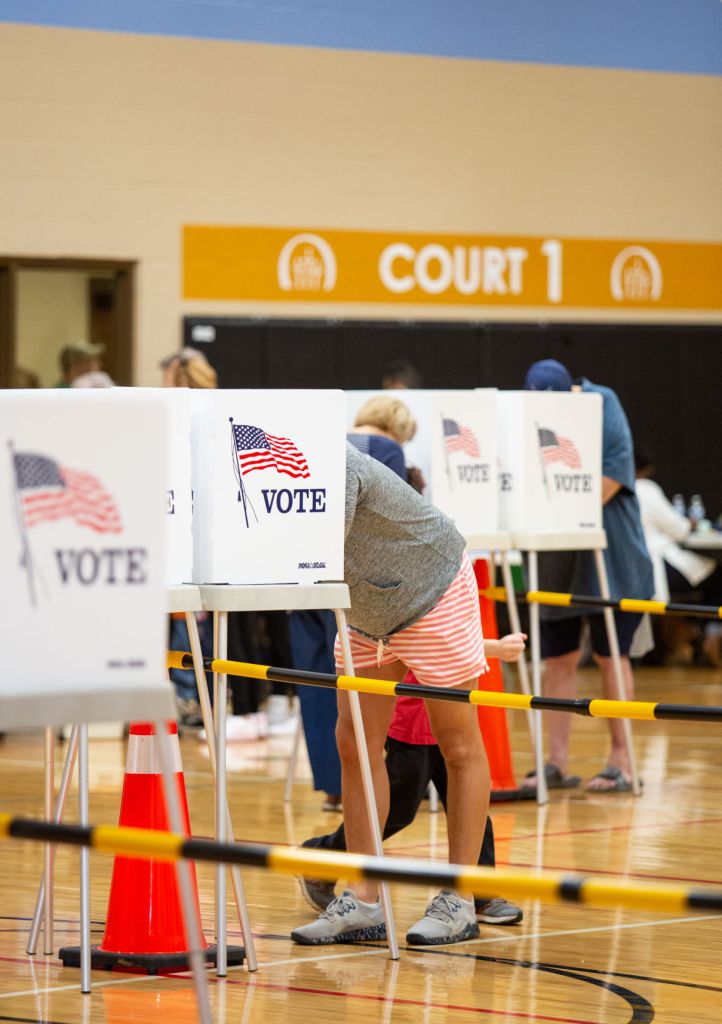The Governor’s Race: Beshear and Cameron on elections, voting
Published 2:08 pm Friday, September 22, 2023

- Voters cast their ballots at Living Hope Baptist Church on Westen Street in Bowling Green, Ky., on Tuesday, Nov. 8, 2022. (Grace Ramey/gramey@bgdailynews.com)
This is the fifth article in a weekly series covering the top issues Kentuckians consider before they head to the polls in November. The governor’s race will delve into candidates’ stances on various issues, and whether their record matches their words and promises.
Since 2020, election integrity has been on everyone’s mind.
What have Gov. Andy Beshear and Attorney General Daniel Cameron said and done about elections and voting in the past few years?
Beshear on early voting and mail-in ballots
As COVID began spreading across the country in 2020, states like Kentucky adapted their election processes in light of the pandemic.
During the June 2020 primary election, Secretary of State Michael Adams and Beshear agreed to expand universal mail-in voting for anyone who asked for an absentee ballot.
Later that year, for the November presidential election, the absentee ballot by mail expansion was pared back.
While voters could no longer request an absentee ballot with no excuse, they could say they wanted one because they feared catching or spreading COVID.
This move was combined with three weeks of early voting.
“I think we both wanted a successful election where we could protect people’s health and did what we believe will be one of the larger turnouts we’ve seen because of there are so many options to vote,” Beshear said at the time.
All ballots had to be postmarked by Election Day and received by county clerks within three days of the election.
Beshear continues to support mail-in ballots.
“We ought to be able to vote by mail. We’ve done it before,” he said at his most recent weekly press conference.
“There was an election that we showed it is doable. That it doesn’t promote fraud, that we can add the security to it. And think about how many more people would vote if everybody could have no-excuse absentee voting by mail.”
Cameron on early voting and mail-in ballots
In his capacity as attorney general, Cameron joined a lawsuit against mail-in ballots in Pennsylvania in the 2020 presidential election.
He filed an amicus brief alongside other attorney generals asking the U.S. Supreme Court to reverse a Pennsylvania high court ruling that allowed absentee mail-in ballots to be counted “without a legible postmark” several days after Election Day.
Cameron did not take any legal action concerning Kentucky’s elections.
“My interest in this is not about courts dictating who wins or loses but about transparency and rule of law issues that should give all Americans the confidence that the election was conducted fairly,” he said in a statement at the time.
“Ultimately, we all have to accept the results, and it will be hard for some people to do that is they think issues like these go unexplored.”
Cameron’s office also collaborated with Adams on a Ballot Integrity Task Force to monitor potential vote fraud. It tracked and investigated complaints about electioneering and procedure before, during and after the election.
“In light of changes to the process resulting from COVID-19, the integrity of our election has never been more important, and I appreciate the shared commitment of each of the task force members,” he said.
While Cameron is endorsed by former President Donald Trump, who has repeatedly falsely claimed that the 2020 election was “stolen,” Cameron has not repeated those claims.
“The election was fair and secure here in Kentucky,” Cameron said at a 2022 political event. “Look, we’ve got to focus on the future. And that’s what this campaign’s about.”
Cameron has shown some support of early voting recently. In June, he tweeted his support for a Republican initiative, Bank Your Vote, encouraging Republicans to participate in early and absentee voting.
Beshear vetoes
Beshear has vetoed a few election bills during his term.
In 2020, he vetoed Senate Bill 2, a voter ID bill that required a photo ID to vote.
Previously, identification was required, but not a photo ID. The bill made drivers licenses, military, college or Kentucky government IDs eligible to meet the requirement.
Those who didn’t have a driver’s license were permitted to get a free photo ID at their county clerk’s office after signing an affidavit.
Beshear’s veto was overridden. In his veto message, he said that the law would “create an obstacle to the ability of Kentuckians to exercise their right to vote, resulting in few people voting and undermining our democracy.”
He wrote that requiring Kentuckians to get a photo ID during the COVID pandemic threatened their health and safety.
Beshear added that there was no evidence supporting voter fraud in Kentucky via impersonation – “therefore, the legislation would be attempting to resolve a problem that does not exist.”
The governor also vetoed a more recent 2022 election omnibus bill with many provisions, including a faster transition to paper ballots, a post-election audit of more counties and video surveillance of voting machines and ballot boxes outside of polling hours.
However, in his veto message, Beshear said that the provision he opposed was one allowing legislative candidates to file an annual campaign finance report, as opposed to the previous quarterly reports.
He said that it would allow candidates to receive donations “in secret.”
“Studies have shown that legislators prioritize the interests of their donors, and more money is flowing into political races than ever before,” Beshear wrote.
“As a result, it is more important than ever to maintain transparency and accountability in our elections.”

